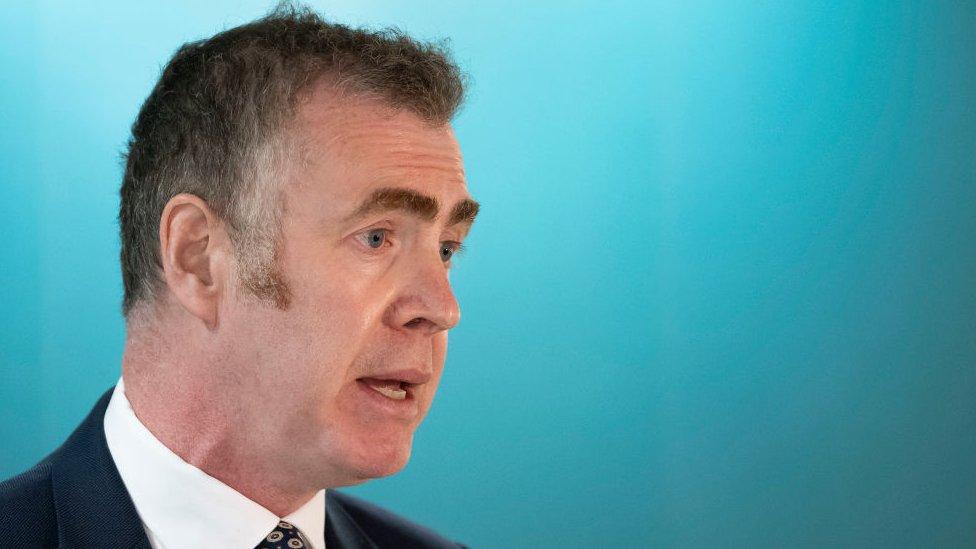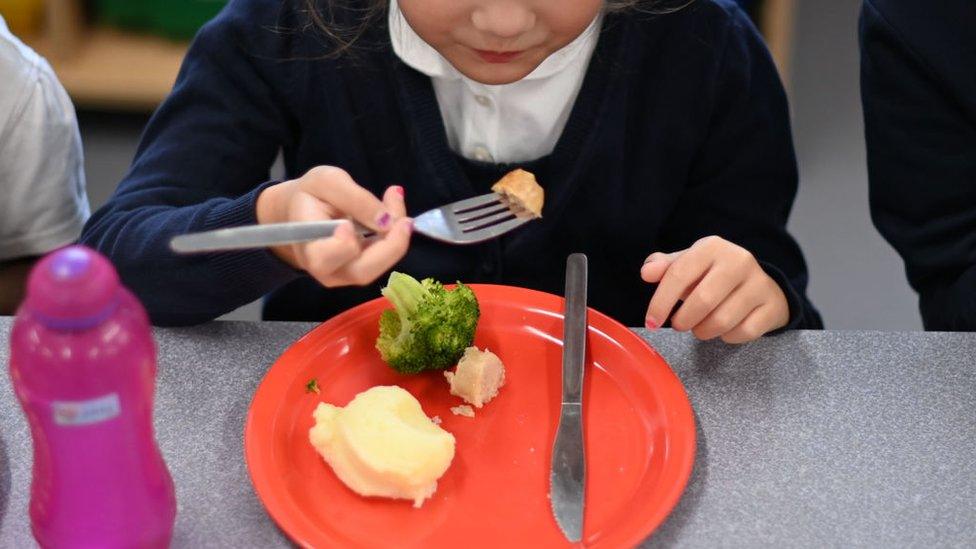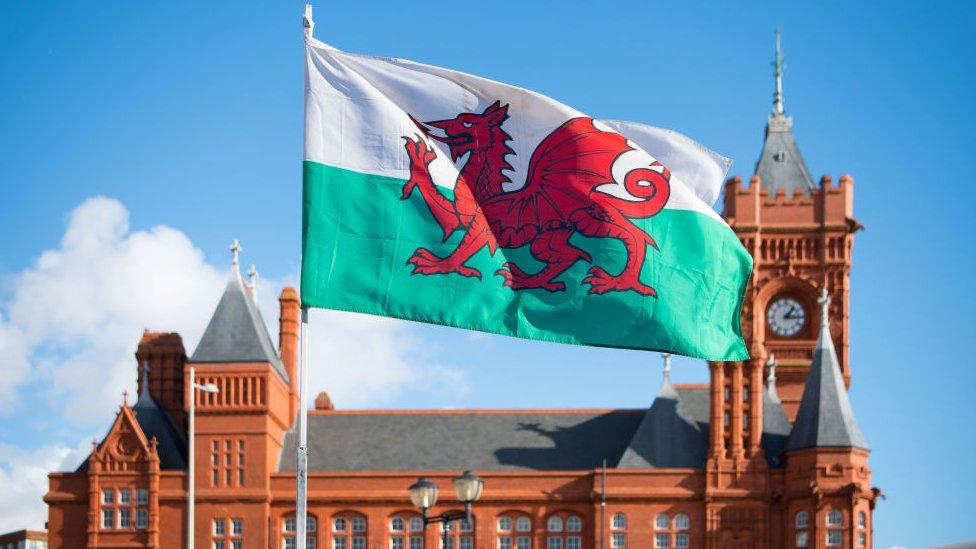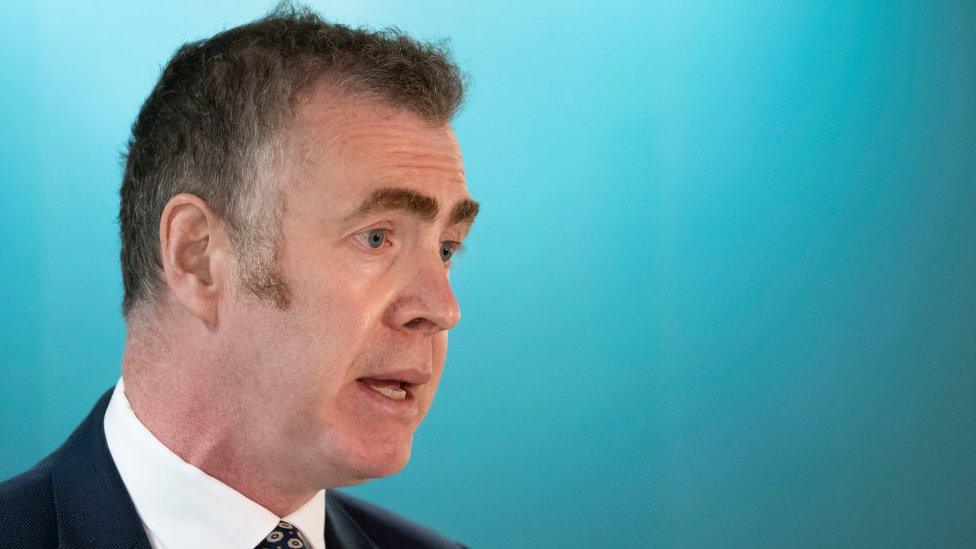Welsh elections 2021: Plaid promises to change funding system for poorer pupils
- Published

Adam Price says his party would change the link between pupil deprivation grants and free school meals
A Plaid Cymru government would change the funding system for helping poorer school pupils, its leader has said.
Adam Price said the link between the pupil deprivation grant and free school meals "would have to change".
Plaid is promising a big expansion of free meals if it is in power after May's election.
But Mr Price said it "would maintain and increase the focus on educational attainment" and find other ways of increasing funding.
Labour has accused Plaid of announcing "headline-grabbing policies without thinking about the knock-on effect on schools and families".
If Plaid Cymru is in power after May's Senedd election, the party is promising to firstly extend free school meal provision to all children whose parents get universal credit, before then offering free meals to all primary school pupils by the end of the next Senedd term.

SIGN UP FOR WALES ALERTS: Get extra updates on BBC election coverage

Speaking on the BBC's Politics Wales, Mr Price said the policy would cost £160m a year by the final year of the Senedd term.
Under the current system, schools are given a pupil deprivation grant (PDG) of £1,150 a year for every pupil eligible for free meals.
Mr Price said the link between the PDG and free school meals would "clearly" have to change under Plaid's proposals.
"Because as you make it universal then it becomes, by definition, universal," he said.

Plaid is promising a big expansion of free school meals
Mr Price was asked if the link would initially be kept as the meals policy was expanded to cover people receiving universal credit.
He said: "There would need to be a link, but we'd have to look at how we address the problem of educational attainment, and use other means of targeting investment in those schools where we have higher numbers of the disadvantaged."
Mr Price insisted the party "absolutely would maintain and increase the focus on educational attainment because we haven't closed the gap as fast as we need to".
"In addition to the free school meals policy, of course, we are undoing the real terms cut that there has been in terms of per pupil funding in education overall.
"We're putting an extra £300m, by the end of the Senedd term, into schools so we can have those 4,500 extra teachers and specialist staff," he said.
"A lot of that is absolutely about addressing the educational attainment gap, which is holding the whole of the nation back."

WALES ELECTION: THE BASICS
What's happening? On 6 May, people will vote to elect 60 Members of the Senedd (MSs). The party that can command the support of a majority of MSs will form the Welsh government. Find out more here.
What powers does the Senedd have? MSs pass laws on aspects of life in Wales such as health, education and transport - and have some tax powers.

A Welsh Labour spokeswoman said: "Once again, Plaid Cymru have announced headline grabbing policies without thinking about the knock-on effect on schools and families.
"It's the height of irresponsibility at a time we need to focus on helping all pupils catch up in school after the disruption caused by Covid.
"Welsh Labour will protect the link to direct support for disadvantaged children because it is crucial to our mission to boost attainment."
Writing in the Sunday Times, Conservative Senedd leader Andrew RT Davies said 22 years of Labour-led governments had led to "a stark decline in our economy, infrastructure and public services".
Mr Davies said the Welsh government "promised to eradicate child poverty, but we now have the highest proportion of children - three in 10 - living in poverty out of all the UK nations".
In 2016, the Welsh government said a long-held target to end child poverty by 2020 could not be achieved because progress was being hindered as a result of UK government welfare reforms.
Welsh Liberal Democrat leader Jane Dodds said: "We need to make sure that we continue with that funding, that that doesn't change because that is absolutely fundamental to the changes we need in narrowing the gap in education between the poorest pupils and those who are doing well."

POLICY GUIDE: Who should I vote for?
FIRST TIME: Will 16-year-olds vote?

- Published4 April 2021

- Published19 April 2021

- Published12 April 2021

